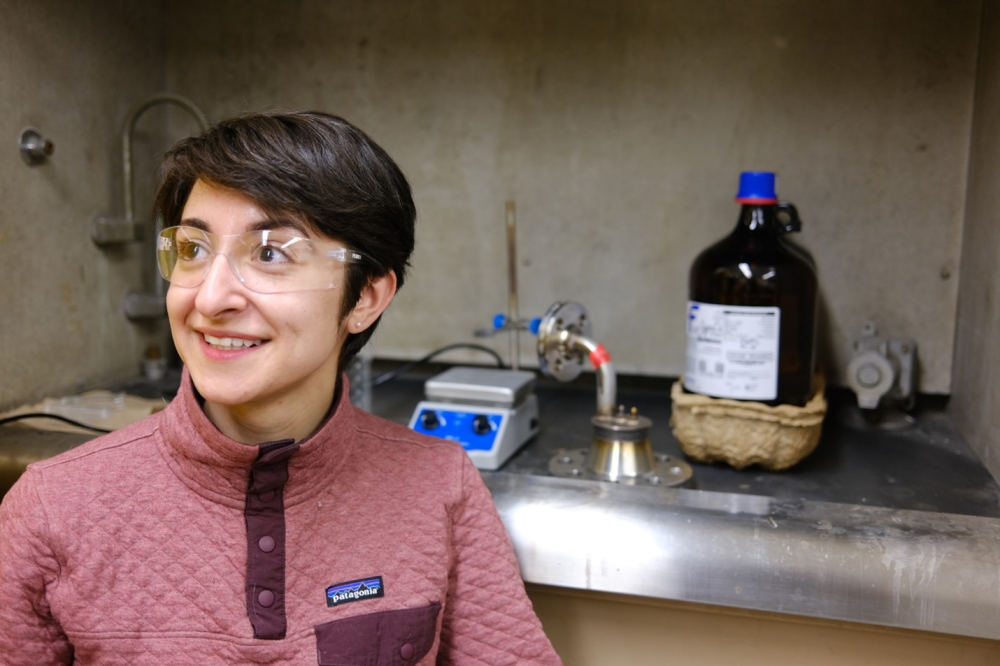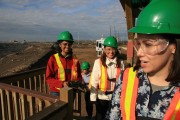Over the last two years, Pembina has examined the barriers to gender equity in the energy sector and has proposed solutions to be adopted by the province, federal government and leaders. This forthcoming series of interviews celebrate women advancing Canada’s transition to a clean economy and offers their insights into the opportunities to make the net-zero future one where all Canadians can participate and lead.
Laboratory work on sustainable energy technologies that began when she was 19 led to Alexandra’s life-long interest in renewable resource use and the energy transition. Today, she is a postdoctoral associate at the Massachusetts Institute of Technology, where she studies carbon dioxide capture from a technological and economic perspective. This complements her previous work on carbon dioxide conversion into commodity chemicals that are normally sourced from fossil fuels, providing perspective on the whole sustainable carbon value chain. A large part of her work thus far has been focused on using low-carbon energy sources to drive chemical processes, as a way of reducing the industry’s reliance on fossil fuels. As part of this effort, she previously ran a start-up company called Solistra which aimed to commercialize solar-driven carbon dioxide utilization processes. In addition to her technical work, Alex serves as the Chair of the Board of Directors of Iron and Earth, a Canadian worker-led not-for-profit with a mission to empower fossil fuel industry and Indigenous workers to build and implement climate solutions. In 2024, Alex will join the University of British Columbia as an Assistant Professor in their Mechanical Engineering Department.
Why is the energy transition important to you?
The energy transition is important to me because it presents an opportunity for real systemic change that can have a number of knock-on social welfare benefits. Transitioning to a less centralized, locally-managed, low-carbon energy and industrial sector can revitalize communities across Canada by creating local employment opportunities, improving worker welfare, and ultimately building a foundation of stronger climate resilience for a larger number of communities across a larger area of Canada. Since we have to build a huge amount of infrastructure to meet our emissions reduction goals, why not use that investment to build a new type of energy system that will benefit local communities in the long-term while simultaneously ensuring their successful adaptation to the accelerating effects of climate change?
What are the key challenges you’ve faced in your career, and what are your thoughts on their solutions?
As an individual, when I was younger my main career challenge was deciding what type of work in the sustainability space I wanted to pursue. I ended up trying out a number of different opportunities ranging from technical engineering work, to work in the non-profit sector, as well as entrepreneurship. I would encourage any young people to try out a few different types of work to gain a wider perspective on the sector, and to find out what type of work and segment of the sustainability sector excites and motivates you. As a professional, the key challenge I’ve faced is reconciling the fact that all industrial processes will inevitably have some impact on the Earth. Understanding and minimizing the impacts of those industrial processes and finding low-impact implementation scenarios for them motivates my research and current work.
What does a successful energy transition look like to you?
To me, a successful energy transition would result in an energy system that is more equitable and just than the carbon-intensive one we are hopefully transitioning away from. This may involve prioritizing community-based, decentralized energy systems in our policy that provide improved community autonomy and security going forward.
Lightning Round
What book is on your nightstand?
I recently finished reading Pyrocene by Stephen J. Pyne, who is a fire ecology Professor at Arizona State University. The book explores how humans came to exploit fire as a technology, and the ways in which that upset the Earth’s natural fire cycle and led to the accumulation of carbon dioxide in the atmosphere that has led to the climate crisis. Since the combustion of fossil fuels is a big part of that environmental imbalance, it provided a really interesting perspective from which we can think about our fight against climate change.
What is the proudest accomplishment of your life?
My proudest accomplishment is that I’ve managed to find steady work in the sustainability or clean technology space for the entirety of my career which has been a big privilege. I’m very grateful to have found engineering work that I find both interesting and can help contribute to the effort to fight climate change.
If you were granted one wish to make the world a better place, what would it be?
I would wish for the answers to the climate crisis to be simple. (A girl can dream)
Describe the future of energy in one word.
I would like the future of energy to be “decentralized” or “community-based”.
This profile also appeared as part of the Women in Energy Transformation Series, a series of four national dialogues co-hosted by the Pembina Institute and GLOBE Series. You can view the rest of the profiles here.
The Pembina Institute also wishes to to thank the McConnell Foundation and Women and Gender Equality for their generous support of Pembina’s ongoing work on advancing gender equity in energy.






